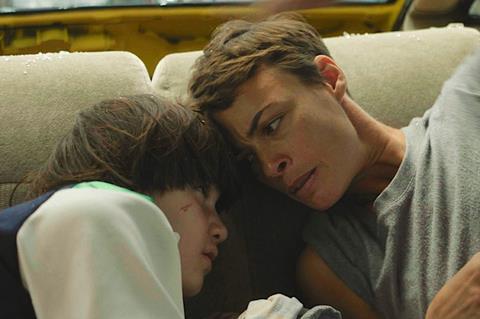Bérénice Béjo stars as a Guatemalan activist exiled to Mexico who must rebuild her relationship with her 10-year-old son

Dir/scr. César Diaz. Belgium/France 2024. 89 mins
You could probably programme an entire season of Latin American dramas with places and dates in their titles, recent examples being Santiago Mitre’s Argentina, 1985, Manuela Martelli’s Chilean feature 1976 and now César Diaz’s Mexico 86. This is no coincidence, as specific dates are hyper-significant in films that bear witness to the horrors of relatively recent political history – in Diaz’s film, the iniquities of Guatemala’s military regime in the 70s and 80s. Following his 2019 debut feature Our Mothers and his preceding documentaries, writer-director Diaz continues to cast the spotlight on his country’s fraught past in a political thriller with an especially personal spin.
A political thriller with an especially personal spin.
Dedicated to his mother and inspired by their relationship, Mexico 86 tells the story of a woman living in exile away from her child. Told, as one might expect, con amore – but with irreducible steeliness – the film resonates emotionally thanks to a sensitive but forceful lead from Bérénice Béjo, whose presence should help put the film on the map following its premiere in Locarno’s Piazza Grande.
The story begins in Guatemala City in 1976, where Maria (Béjo), an activist committed to armed struggle, sees her partner and political comrade shot dead by police; escaping with their baby Marco, she is told by her cell that she must flee the country. Maria’s mother Eugenia (Julieta Egurrola) takes charge of the child – and we soon see her and 10-year-old Marco (Matheo Labbé) visiting Maria a decade later in Mexico City.
Now using the name Julia, Maria still operates as a militant, under cover of a dizzying array of wigs, while working as a proof-reader on real-life left-wing magazine Proceso. Maria is entrusted with a secret file containing extensive details of people tortured and killed by the Guatemalan government. She is given the job of getting this information published – a task with a pressing time factor, as Guatemalan officials have been invited to the imminent opening of the 1986 World Cup in Mexico City, and this is a crucial opportunity to warn Mexicans against complicity with their neighbouring country’s crimes.
Meanwhile, Eugenia, now terminally ill, can no longer look after Marco. Maria’s superiors insist that the boy should be sent to a ‘hive’ in Cuba, where activists’ children are looked after, but she fiercely resists – maternal love overriding her former unconditional commitment to the cause. As she and her partner and co-activist Miguel (Leonardo Ortizgris) find Guatemalan security forces moving in on them, the psychological pressure mounts and young Marco – trying his best to start a new life with his estranged mother – inevitably starts to rebel.
Adeptly crafted, Mexico 86 maintains a tense, slow-burn pace accentuated by the claustrophobic feel of the widescreen cinematography by Virginie Surdej, who also shot Our Mothers and has worked with Moroccan directors Nabil Ayouch and Maryam Touzani. The palette uses faded beige and burnt orange, hues often associated in cinema with the 70s and 80s; but the overall naturalism is also undercut by heightened colour effects including an ominously glacial wash of green – as in a scene where an underground car park takes on a chilly aquarium feel.
Diaz tightly interweaves two genre strands. On one hand there is the political thriller in the Costa-Gavras tradition, including a race against time and several tense, briskly edited escapes. Alongside it runs the family melodrama, as the emotional centre shifts between the mother who must leave her child, and the boy who understands her cause but has always lived with the pain of separation – most poignantly captured by the fact that, for safety reasons, Marco has never had a photo of his mother
Mexico 86 offers Béjo a substantial, compelling lead; it shows the Argentinian-born star absolutely at ease in a Spanish-language role, and using her characteristically low-key performance style to potent effect. Bejo’s restraint works beautifully on different levels: as a woman living a life of subterfuge, hiding her identity and her feelings in the face of permanent danger; and also as a mother whose love for her son involves unbearable conflict and the awareness that her protective care may not be remotely adequate in the face of danger.
Young newcomer Matheo Labbé makes a strong impression as a precociously mature and sensitive child whose rebelliousness is on the verge of exploding under intolerable conditions. He chimes affectingly with Béjo – and with Ortizgris and Egurrola – in a film that manifestly has heart, yet is as tautly controlled and unsentimental as its heroine.
Production companies: Need Productions, Tripode Productions
International sales: BAC Films, Vincent Llobell v.llobell@bacfilms.fr /Goodfellas, Solene Michel smichel@goodfellas.film
Producers: Delphine Schmit, Géraldine Sprimont, Anne-Laure Guégan
Cinematography: Virginie Surdej
Production design: Pilar Peredo
Editing: Alain Dessauvage
Music: Rémi Boubal
Main cast: Bérénice Béjo, Matheo Labbé, Leonardo Ortizgris, Julieta Egurrola
























